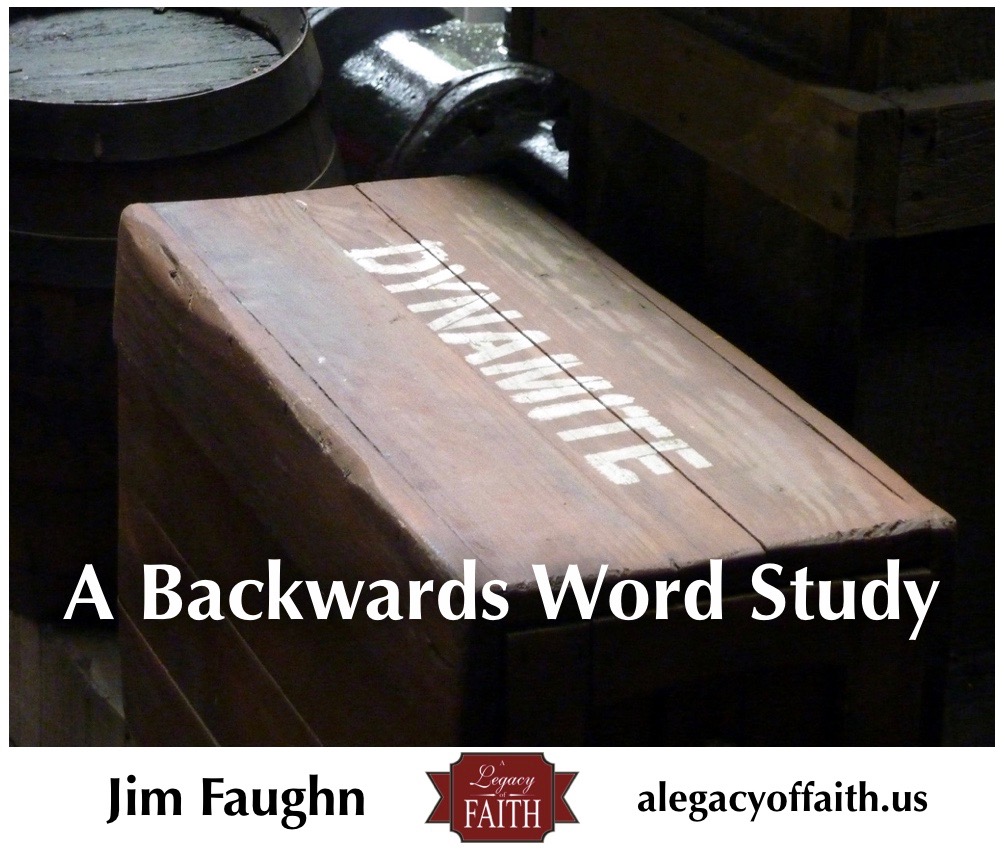A Backwards Word Study

The August 2017 issue of Old Paths contained an article by brother Danny Tunnell. Although I have never met brother Tunnell, I am indebted to him for some interesting and challenging insights. I wanted to give him the credit he deserves because what I am writing here has been heavily influenced by his article. It is tempting to merely reproduce what he wrote, but I would like to “put my own spin” on the information he provided.
Brother Tunnell dealt in some detail the Greek word dunamis. That Greek word is often translated as “power” in the New Testament. Even if you did not read his article and/or if you’ve never seen the word dunamis, it might not surprise you to learn that our word dynamite is based on that word.
According to Thayer’s Greek-English Lexicon of the New Testament, the word dunamis has the following meanings:
1. strength, power, ability
a. inherent power, power residing in a thing by virtue of its nature, or which a person or thing exerts and puts forth
b. power for performing miracles
c. moral power and excellence of soul
d. the power and influence which belong to riches and wealth
e. power and resources arising from numbers
f. power consisting in or resting upon armies, forces, hosts
Do you see the word “dynamite” anywhere in all of that? Do you see any indication that dunamis must always refer to something dynamic, earth-shaking, and/or spectacular?
One of the more familiar passages in which we find dunamis is in Romans 1:16. The King James Version of that verse reads as follows:
For I am not ashamed of the gospel of Christ: for it is the power of God unto salvation to every one that believeth; to the Jew first, and also to the Greek.
Here’s the rub. Here’s where we may have been guilty of what I am choosing to call a backwards word study. Please allow me to explain.
Dynamite was invented and patented by Alfred Nobel in 1867. It was originally called “Nobel’s Blasting Powder.” The New Testament was completed before the end of the first century A.D. All of this means that a nineteenth-century product got its name from the meaning of a Greek word used in the first century. To be more specific; dynamite gets its name from one of the meanings of dunamis.
So, instead of considering all of the ways in which dunamis is used, we choose the only one that was used for one specific reason in the nineteenth century and assume that is what the Holy Spirit had in mind when He inspired Paul to write Romans 1:16. Besides being unwise, that can lead to all kinds of problems.
It seems that, if we see “dynamite” every time we find a reference to the gospel, we would expect a spectacular messenger to deliver a spectacular message and get spectacular results every time the gospel is preached. In short, the thinking must be that every Bible class, sermon, and/or time of personal study must be a time when I am “blown away” by the message of God.
It might even be tempting (and, sadly, many have yielded to this temptation) to “help” the power of the message and/or messenger with special lighting, “over the top” musical productions, etc. Some preachers have even adopted a style that I would call “affected drama” to appeal to emotions or to try to make sure that people are “blown away” by their presentations. Seemingly, the primary (if not only) purpose of preaching is to elicit strong emotions.
To be sure, the gospel should have an emotional effect on both the messenger and those who listen to the message, but “fake emotionalism” should (in my opinion) have no place in the presentation of the Truth of God. While I have never known any of these men personally, I have heard of men who would include in their sermon notes a notation that read: “cry here” and/or other notations that might be appropriate for a dramatic presentation (a “dynamite” performance).
As I was typing these words, another thought came to my mind. The “active agent” in dynamite is nitroglycerin. It would not surprise me to learn that some who are reading these words may be carrying a bottle of nitroglycerin pills in a pocket or purse. These people do not intend to blow something up. They hope to save their own lives. They find some comfort in the knowledge that, in the event of severe chest pains, one of these tiny little pills might prevent a fatal heart attack.
That, it seems to me, may help us to see what I consider to be a healthy way to view God’s message and how it is to be presented. The Bible and its effects are, in fact, often spectacular. Nothing I am typing here is meant to deny or denigrate that.
At the same time, it needs to be remembered that, in the “Parable of the Sower,” our Lord said that “…the seed is the word of God” (Luke 8:11). When I plant a seed, I do not expect a flower, a tree, some fruit, or a vegetable to explode out of the ground in some dramatic and spectacular way. I expect the seed to produce what God intended for it to produce in the manner in which God intended for the process to happen and according to His timetable.
Similarly, there will be times when something spectacular will happen when the gospel is preached if that is God’s desire on that occasion. At other times, the gospel may convert, convict, correct, comfort, and do a lot of other things. The bottom line is that the gospel is able to fulfill God’s purpose for it in any and all occasions and at any and all times.
The focus of a preacher needs to be to present the gospel faithfully, not necessarily dramatically. Those who hear the gospel would do well to focus on what is often the long, slow, challenging process of becoming more Christlike instead of waiting for something spectacular to happen.
We should have figured out a long time ago that God has a plan for His word that does not have to include the spectacular. Consider what he said even before His Son left heaven to come to earth:
For as the rain and the snow come down from heaven
and do not return there but water the earth,
making it bring forth and sprout,
giving seed to the sower and bread to the eater,
so shall my word be that goes out from my mouth;
it shall not return to me empty,
but it shall accomplish that which I purpose,
and shall succeed in the thing for which I sent it.
(Isaiah 55:10-11, ESV)
To Receive Every Article from A Legacy of Faith through Email for Free, Click Here
AUTHOR: Jim Faughn
Photo background credit: Sean MacEntee on Creative Commons


